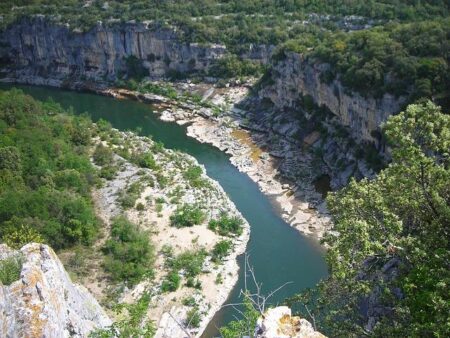France Green News: Fishing Rules, First Hybrid Building, and Pesticide Risks
In a significant stride towards environmental sustainability, France is actively reshaping its relationship with nature and industry. Recent developments highlight key initiatives, including the introduction of new fishing regulations aimed at preserving marine ecosystems, the completion of the nation’s first hybrid building that merges innovative design with eco-friendly practices, and rising concerns over the risks associated with pesticide use. As France navigates these critical issues, the implications for both biodiversity and public health are becoming increasingly clear, marking a pivotal moment in the country’s green agenda. This article delves into these pressing topics, exploring the challenges and advancements that define France’s commitment to a more sustainable future.
New Fishing Regulations Aim to Protect Marine Biodiversity in France
In a significant step towards safeguarding marine ecosystems, France has enacted new fishing regulations aimed at reducing overfishing and promoting sustainability. These measures, developed in consultation with environmental groups, scientists, and local fishermen, have introduced strict limits on catches for various species, emphasizing the need to maintain healthy fish populations. Key highlights of the regulations include:
- Species-specific quotas: Adjusted catch limits for vulnerable species like cod and sole.
- Seasonal closures: Designated rest periods during peak breeding times to enhance reproduction rates.
- Monitoring and reporting: Increased enforcement of regulations through mandatory catch reporting and regular inspections.
- Habitat protection: Prohibitions against fishing in certain sensitive areas to protect marine biodiversity.
These regulations align with broader European Union initiatives aimed at restoring marine ecosystems and enhancing fish stocks. Stakeholders are optimistic that by fostering sustainable fishing practices, France will not only preserve its rich marine heritage but also boost the economic viability of coastal communities reliant on fishing. Additionally, public awareness campaigns will accompany the new measures to educate consumers about sustainable seafood choices, ensuring that the effort extends beyond regulatory frameworks and into the hearts and minds of the public.
Innovative Hybrid Building Sets Green Standards in Sustainable Architecture
A groundbreaking hybrid building has recently been unveiled in France, setting a remarkable example for sustainable architecture across the globe. Combining traditional construction methods with cutting-edge technology, this innovative structure utilizes a mix of materials including timber, steel, and specially developed bioplastics. Such materials not only reduce the carbon footprint during construction but also enhance energy efficiency. The project emphasizes the importance of creating spaces that maintain ecological integrity while catering to modern urban demands, ultimately aiming to inspire future developments in both residential and commercial architecture.
Key features of this pioneering building include:
- Green Roofs: Designed to improve insulation and promote biodiversity.
- Rainwater Harvesting Systems: Collecting and reusing rainwater for irrigation and sanitation.
- Smart Energy Solutions: Integrating solar panels and smart grids to minimize energy consumption.
In an age where sustainability has become imperative, this hybrid building not only complies with stringent environmental regulations but also redefines community aesthetics. By pushing the boundaries of conventional design, it fosters a shift towards greener living while enhancing the quality of life for its occupants.
Growing Concerns Surround Pesticide Usage and its Impact on Public Health
The increasing prevalence of pesticides in agriculture has raised significant questions about their effects on both the environment and public health. Recent studies have shown that exposure to certain chemicals commonly used in pesticides is linked to a range of serious health issues, including respiratory problems, neurological disorders, and even certain types of cancer. Experts warn that inhalation or skin contact with pesticide residues can lead to both acute and chronic health conditions that may not manifest until years later.
In response to these alarming findings, various health organizations and environmental groups are calling for stricter regulations on pesticide usage. Key recommendations include:
- Adopting integrated pest management techniques that prioritize non-toxic alternatives.
- Implementing comprehensive public education campaigns to inform consumers about pesticide use in local agriculture.
- Increasing funding for research focused on the long-term health impacts of pesticide exposure.
Fostering a more sustainable approach to agriculture could significantly mitigate these risks while ensuring food security and safety for future generations.
France’s Path Towards Environmental Responsibility: Strategies and Recommendations
France is making significant strides in its commitment to environmental responsibility, implementing innovative strategies aimed at sustainable development. Key among these initiatives is the introduction of stricter fishing regulations designed to protect marine biodiversity while balancing the needs of local communities. This includes enforcing seasonal limits, promoting selective fishing gear, and establishing marine protected areas. Furthermore, the integration of digital monitoring technologies will enhance compliance, ensuring that fishing practices align with ecological preservation goals.
In a landmark development, France recently unveiled its first hybrid building, which combines traditional construction techniques with modern green technologies. This flagship structure is designed to minimize carbon footprints through solar panels, energy-efficient designs, and sustainable materials. Additionally, the government is addressing the risks associated with pesticides by launching a comprehensive review of their use in agriculture. Recommendations include promoting organic farming, incentivizing reduction in pesticide use, and enhancing public awareness campaigns. Such measures aim to safeguard not only environmental health but also public well-being.
In Conclusion
In conclusion, France continues to forge ahead in its commitment to environmental sustainability, as underscored by recent developments in fishing regulations, the unveiling of the nationŌĆÖs first hybrid building, and ongoing discussions surrounding pesticide risks. These initiatives not only reflect FranceŌĆÖs dedication to green policies but also set a precedent for broader environmental actions across Europe. As policymakers, scientists, and citizens alike grapple with the challenges of sustainability, these crucial strides highlight the importance of collective efforts to safeguard the future of both the environment and public health. As we monitor these evolving stories, it is clear that France is positioning itself as a leader in the transition towards a greener economy, paving the way for innovative solutions to complex ecological dilemmas. Stay tuned for more updates in the realm of green news as France navigates its path towards a sustainable future.




